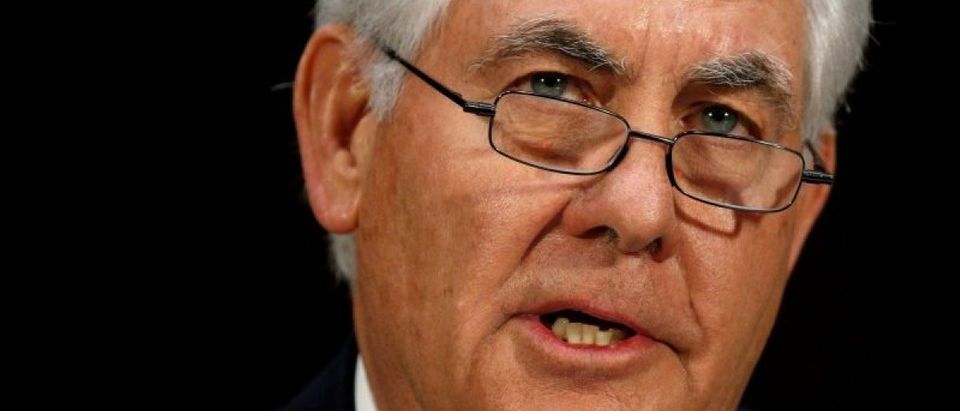Chosen as the touchstone of his inaugural address, President Trump’s belief in American Exceptionalism recognizes the primacy of citizens’ lives, prosperity and strategic national interests over globalist whims. Consequently, the administration seeks to re-imagine and deconstruct the antiquated administrative state.
This is not solely a domestic initiative. American foreign policy requires a 21st Century State Department; and, fortuitously, Secretary of State Rex Tillerson is uniquely (and untraditionally) qualified to build it.
Amid a communications revolution where the individual is empowered to make their own decisions to extents undreamt by past generations, “top-down” bureaucracy has become the enemy of liberty, prosperity and security. In domestic affairs, it is admittedly easier to discern the “flattening” power of the Grassroots Revolution – after all, we live in a “consumer-driven economy.” The President’s domestic goal, therefore, is to match our “consumer-driven economy” with a “citizen-driven government.”
Yet, how does this translate into foreign affairs?
Necessity being the mother of (re-)invention, at a time of escalating conventional and asymmetrical threats, the military and Homeland Security continually assess and refine their operational structures to ensure they possess the ingenuity, agility and accountability to maximally deter and defeat America’s enemies. Still, State has lagged behind, despite the urgent need to reform the substance and practice of American statecraft.
Once declared ended, history (and America’s enemies) persist. Regrettably guided by this erroneous ideology into searching for a “post-history” foreign policy, past administrations’ State Departments have stumbled about the globe down the blind alley of multi-lateralism, ad hoc reactivity and “nation building” until collapsing at the “leading from behind” dead end. This is not wholly the fault of State Department personnel. It is primarily a failing of a “top-down”, vertically integrated bureaucracy that, by its very nature, traps State’s personnel within failed policy paradigms dictated from above by past administrations.
Some State Department management failures, such as the handling of classified documents on Secretary Clinton’s ersatz email system, have been well-publicized, but other troubling system failures prove the need for reform. For example, the State Department’s inspector general recent report on its inspection of the Bureau of Population, Refugees and Migration indicates that, since 2011, the worldwide refugee admissions processing system (WRAPS) has been operating without an “authority to operate” certification, which certifies that the information in the system is safe from cyber-security threats. Moreover, efforts to curb waste, fraud, abuse in key State Department functions are often met with institutional resistance. In her letter to the editor of The Chicago Tribune (February 7, 2017), recently retired, 25-year State department employee Mary Doetsch recounted that: “I have seen first-hand the abuses and fraud that permeate the refugee program and know about the entrenched interests that fight every effort to implement much-needed reform.”
And the department’s problems aren’t confined to classified information systems or refugee programs. A recent audit of the Defensive Equipment and Armored Vehicle Division (DEAV) of the Bureau of Diplomatic Security found several vulnerabilities, including maintenance issues and a lack of adequate inventory controls for armored vehicles at the DEAV. Another investigation uncovered an employee who misappropriated at least 15 vehicles worth more than $500,000; and five missing vehicles. This despite the painful lessons of the Benghazi debacle that underscore the importance of diplomatic security.
Clearly, the rigid, vertical 19th Century structure of the foreign policy bureaucracy is ill-suited to modern American diplomacy, which requires a foreign service capable of rapid, resounding policy responses. Ergo, Americans need and deserve a 21st Century State Department that is far more performance-driven, results-oriented, effective for and accountable to the American people.
Under a President more concerned with the people of the United States than the praise of the United Nations, this administration’s foreign policy of clear-eyed realism and view of the outmoded administrative state affords a singular chance to makeover the department that puts “America’s best face to the world.”
In Secretary Tillerson, the man and the moment have met. Having led one of America’s greatest multi-national corporations, he’s well versed in foreign affairs; the structure of a consumer-driven economy; and, though clearly no political waif, has no institutional nor political ties impeding his ability to establish a 21st Century State Department infused with and informed by the ingenuity, agility and accountability needed to nurture an enduring Pax Americana.
The President and Secretary Tillerson well know it won’t be easy discarding decades of stale group-think; and reinventing antiquated management practices and structures, including communication platforms to ensure their clarity and effectiveness (after all, the department’s mission is global diplomacy). Early indications are Secretary Tillerson is seizing the reins of reform by refocusing many offices within his agency, including the reassignments at the office of the Deputy Secretary for Management and Resources and the State Department Counselor’s office in preparation of those functions’ being streamlined.
But reform can’t stop on Foggy Bottom’s 7th floor. Succeeding ones must be applied throughout State’s headquarters and foreign missions, which entails critically examining the career foreign service, which has not been a focus of meaningful reform since the Foreign Service Act of 1980.
Based upon our observations while serving on the House Foreign Affairs Committee, the majority of the over 15,000 career Foreign Service officers do outstanding work under often challenging circumstances. They are professionals aware they are charged with implementing the President’s policies not their own. Under the leadership of President Trump and Secretary Tillerson, doubtless these public servants will further excel within a 21st Century State Department that encourages and facilitates the ingenuity, agility and accountability to achieve the President’s vision and fulfill America’ historic mission:
Inspiring the world with what we free people achieve.
Hon. Thaddeus McCotter is the former Chair of the U.S. House Republican Policy Committee and member of the House Foreign Affairs Committee, who represented Michigan’s 11th Congressional District
David G. Sanders is the former Republican staff director of the Subcommittee on International Economic Policy and Trade of the House Foreign Affairs Committee.


